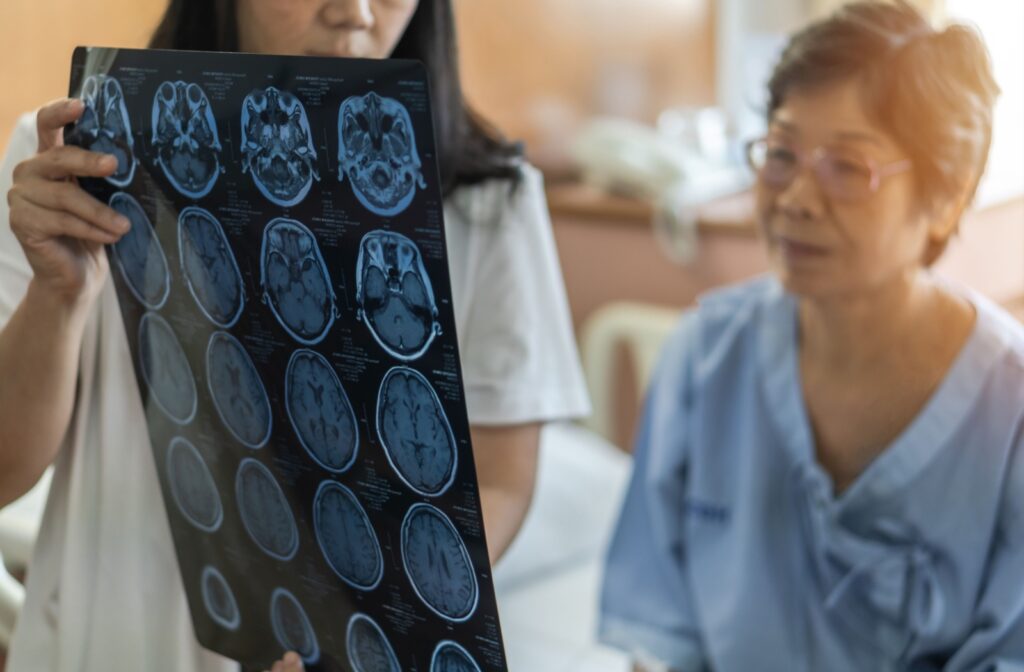Dementia is often associated with aging, but did you know it can affect individuals at a much younger age than most people think? While the typical age range for dementia diagnoses is typically those over 65, early-onset dementia can emerge as early as a person’s 30s or 40s.
Whether you’re concerned for yourself or a loved one or simply seeking knowledge, understanding the connection between age and dementia is important for accessing care as soon as it’s needed.
What is Dementia?
Dementia isn’t a single disease. Instead, it’s an umbrella term to describe a range of conditions involving a decline in cognitive abilities. This decline is severe enough to affect daily life and often impacts memory, problem-solving, language skills, and behavior.
Though memory loss is its hallmark symptom, dementia encompasses much more. People living with dementia may experience difficulty reasoning, changes in mood, or an inability to carry out everyday tasks.
The key takeaway? While dementia is not a regular part of aging, the risk of developing dementia does increase significantly as people age. That said, there are multiple types of dementia, each distinct in its causes and symptoms.
Types of Dementia
Understanding which form of dementia someone may be experiencing assisted with intervention and tailored care. Here’s a breakdown of some of the most common types of dementia:
Alzheimer’s Disease
Alzheimer’s is the most well-known form of dementia, accounting for around 60–80% of all cases. It’s characterized by a gradual decline in memory, thinking, and reasoning skills due to the buildup of abnormal proteins in the brain. Early symptoms often include forgetting recent conversations or events and difficulty planning or solving problems.
Frontotemporal Dementia
This type of dementia primarily affects the frontal and temporal lobes of the brain, which are responsible for behavior, personality, and language. It often sets in earlier than other types, with symptoms typically appearing between 45 and 65. Individuals may experience drastic changes in behavior, difficulty speaking, or a lack of empathy.
Vascular Dementia
Vascular dementia occurs when there’s reduced blood flow to the brain, often due to a stroke or chronic conditions like high blood pressure. Symptoms can include impaired judgment, difficulty concentrating, and slowed thinking. Unlike Alzheimer’s, memory loss may not be the first noticeable symptom.
Lewy Body Dementia
Lewy body dementia is caused by abnormal protein deposits in the brain called “Lewy bodies.” It shares symptoms with both Alzheimer’s and Parkinson’s disease, including memory loss, visual hallucinations, and movement difficulties. Sleep disturbances are also common with this condition.
Each type of dementia has unique characteristics, but age is a common risk factor for nearly all forms. This, of course, leads us to a crucial question:
At What Age Can Dementia Set In?
While dementia is most commonly associated with older adults, it’s a misconception that it’s exclusively an “elderly” condition. The truth is that dementia symptoms can emerge at a variety of ages, depending on individual susceptibility and the type of condition.
- Early Onset Dementia: Dementia diagnosed before the age of 65 is referred to as early-onset dementia. Around 5–10% of all dementia cases fall into this category, and symptoms can appear as early as one’s 30s or 40s.
- Common Age Range: For most people, dementia symptoms emerge post-65. However, certain types, like frontotemporal dementia, have an earlier average age of onset.
- Risk Factors: Genetics, lifestyle, and overall health all affect when dementia develops. Family history and pre-existing conditions (e.g., diabetes or heart disease) significantly increase the likelihood of earlier onset.
Understanding these age-related distinctions and being vigilant about early signs can help individuals and their families take action sooner.
Early Signs of Dementia

Recognizing the early signs of dementia is the first step toward seeking help. While symptoms vary depending on the type of dementia, here are some common indicators to watch for:
- Memory Loss: Forgetting recent events or relying increasingly on memory aids, like notes or reminders.
- Difficulty Performing Familiar Tasks: Struggling to complete routine activities like cooking or balancing a checkbook.
- Confusion About Time or Place: Losing track of dates, seasons, or locations.
- Trouble Finding Words: Pausing mid-sentence or substituting incorrect words for familiar terms.
- Changes in Mood or Personality: Increased irritability, anxiety, or withdrawal from loved ones and activities.
- Poor Judgment: Making uncharacteristically poor decisions or behaving impulsively without logical reasoning.
If these signs become noticeable, it’s essential to consult a medical professional. Early diagnosis can open doors to treatment options, lifestyle changes, and support networks.
How Personal Care Supports Those With Memory Issues
For those living with dementia, personal care programs offer specialized support that goes beyond what traditional care settings can provide. Here’s how these programs make a difference:
Personalized Care Plans
Personal care communities create tailored care plans based on individual needs, abilities, and preferences. Staff are trained to provide compassionate, person-centered care that preserves dignity and fosters self-worth.
Safe Living Environments
Safety is a top priority in personal care settings. From secured areas to minimize wandering to designs that reduce fall risks, these spaces are thoughtfully equipped for individuals with memory challenges.
Engaging Activities
Staying active and engaged is crucial for preserving cognitive function. Personal care programs offer a variety of activities that stimulate the mind and body, such as music therapy, art classes, and gentle exercise.
Support for Families
Caring for a loved one with dementia can be overwhelming. Personal care programs often provide families with resources, support groups, and regular communication to keep them involved.
Personal care doesn’t just support those with dementia; it fosters a sense of community, providing an environment where individuals can live with purpose and connection.
Taking the Next Step
Dementia can feel like an overwhelming diagnosis, but early awareness and action can make a world of difference. Whether monitoring early warning signs, supporting loved ones, or exploring personal care options, every step helps create a positive impact.
At Hickory Woods, we know that caring for someone with Alzheimer’s or dementia is a journey of the heart. Our care is guided by the Through Their Eyes approach—a commitment to seeing life from our residents’ unique viewpoints. Contact us today to see how our community can support your loved one in getting the most out of life.


